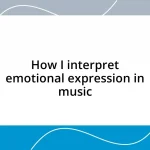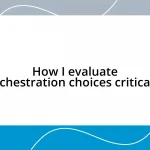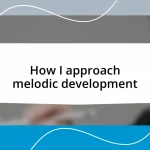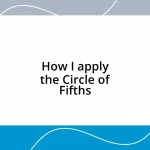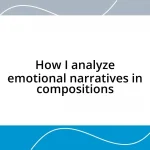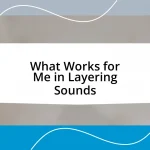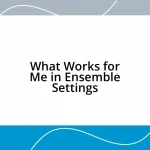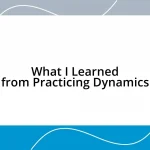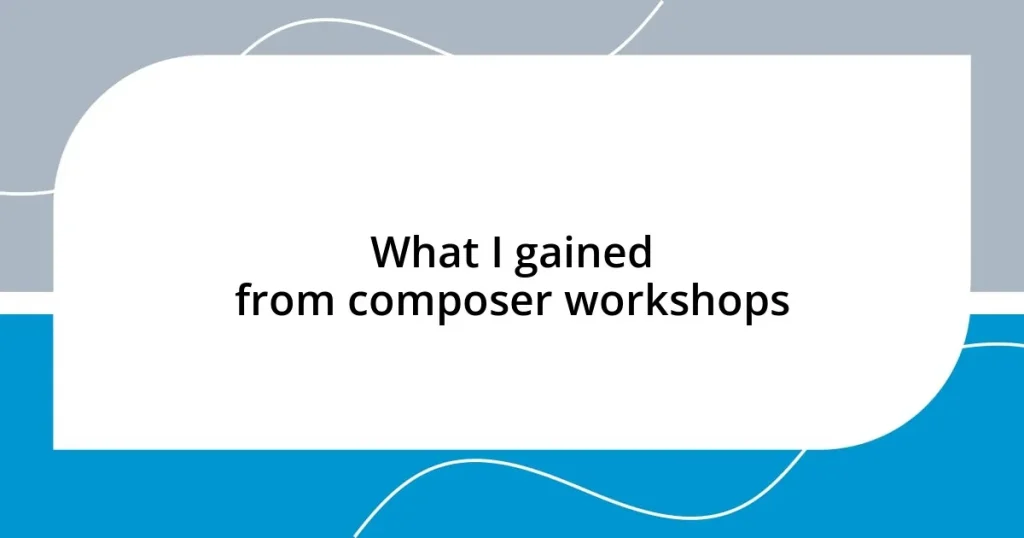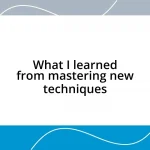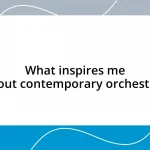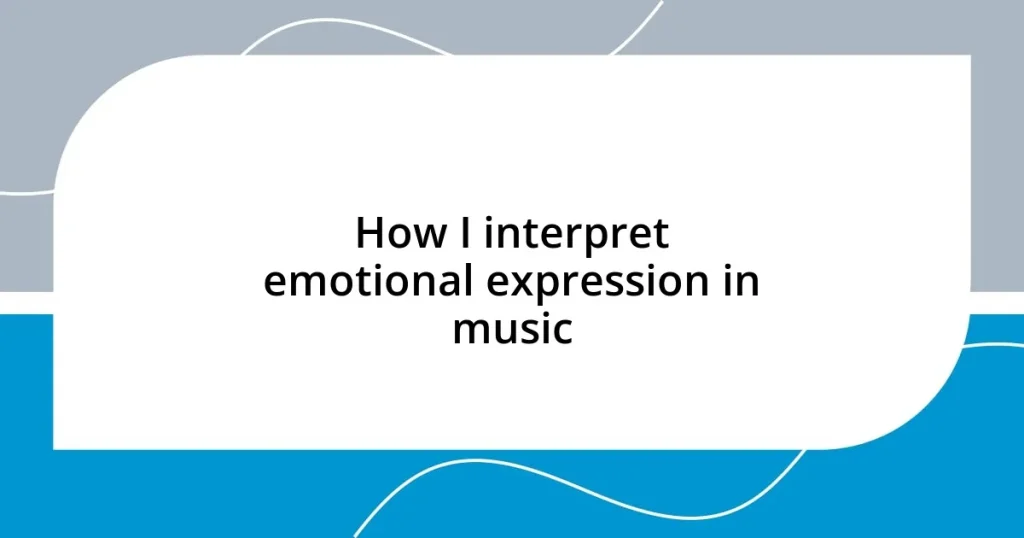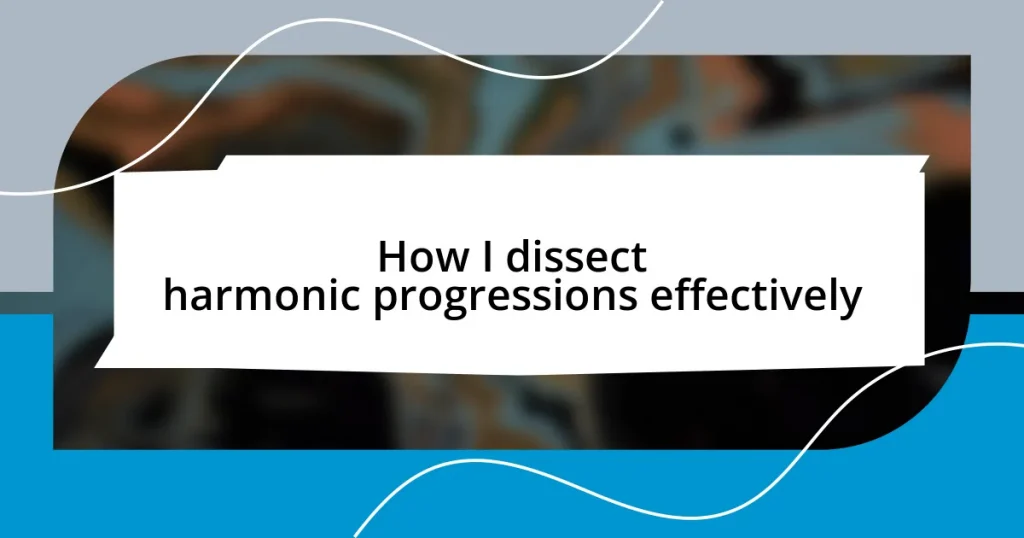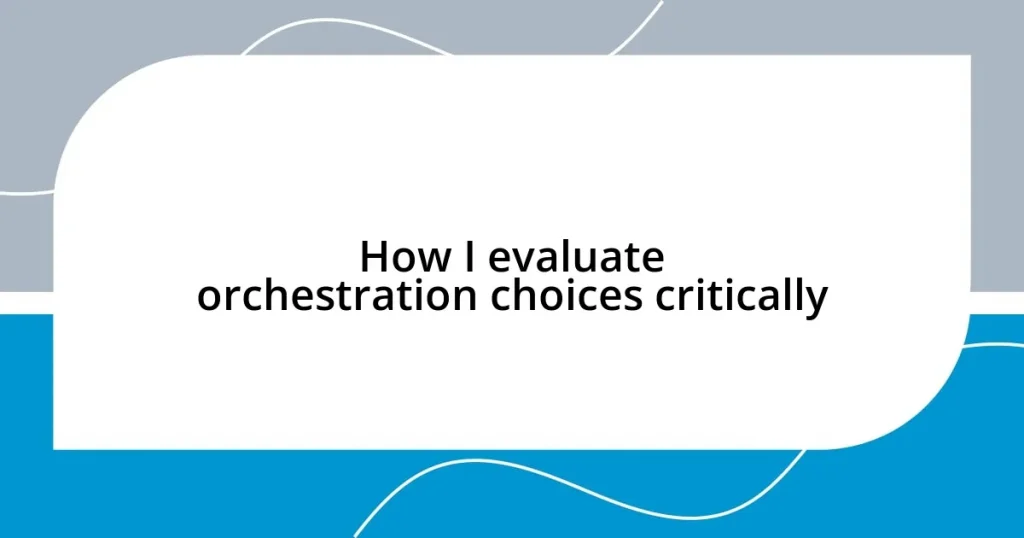Key takeaways:
- Composer workshops foster collaboration, providing constructive feedback that enhances individual growth and perspective on composition.
- Networking opportunities during workshops can lead to lasting professional relationships and collaborations that shape a composer’s career.
- Real-time feedback allows composers to understand techniques better, encouraging experimentation and emotional depth in their music.
- Continuing education after workshops, through online communities and courses, further reinforces skills and promotes ongoing artistic development.
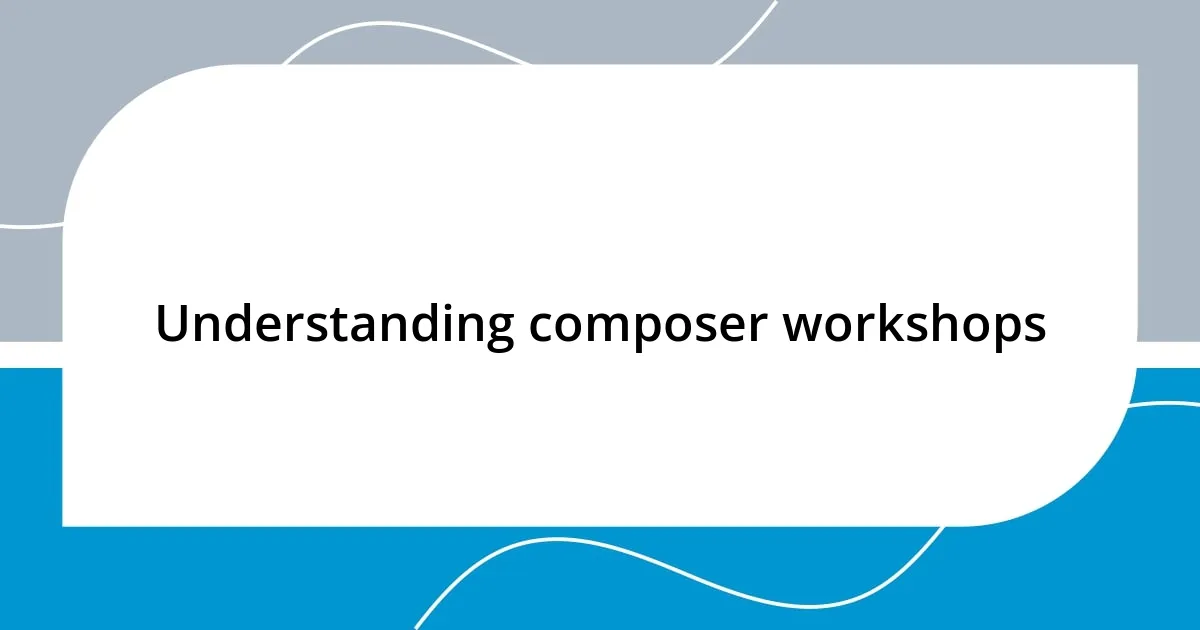
Understanding composer workshops
Composer workshops are unique experiences designed for aspiring and established composers to hone their craft through collaborative feedback and learning. I remember my first workshop vividly, feeling a mix of excitement and anxiety as I shared my scores with others. It was an eye-opening moment when constructive criticism helped me see my work from a completely different angle—what a revelation!
In these workshops, participants aren’t just passive listeners; they actively engage with their peers and mentors, which truly fosters growth. Have you ever wondered how sharing your artistic journey can deepen your understanding of music? I discovered that discussing my creative process with others provided me with fresh perspectives, enabling me to refine my style and approach to composition in ways I never would have anticipated.
The collaborative atmosphere often leads to unexpected friendships and connections within the music community. During one workshop, I met a fellow composer whose style was so different from mine that it challenged my thinking. Sharing insights and learning from one another not only enriches our artistic voices but also creates a supportive environment where vulnerability is welcomed. Isn’t it amazing how a simple exchange can spark new ideas and collaborations that could last a lifetime?
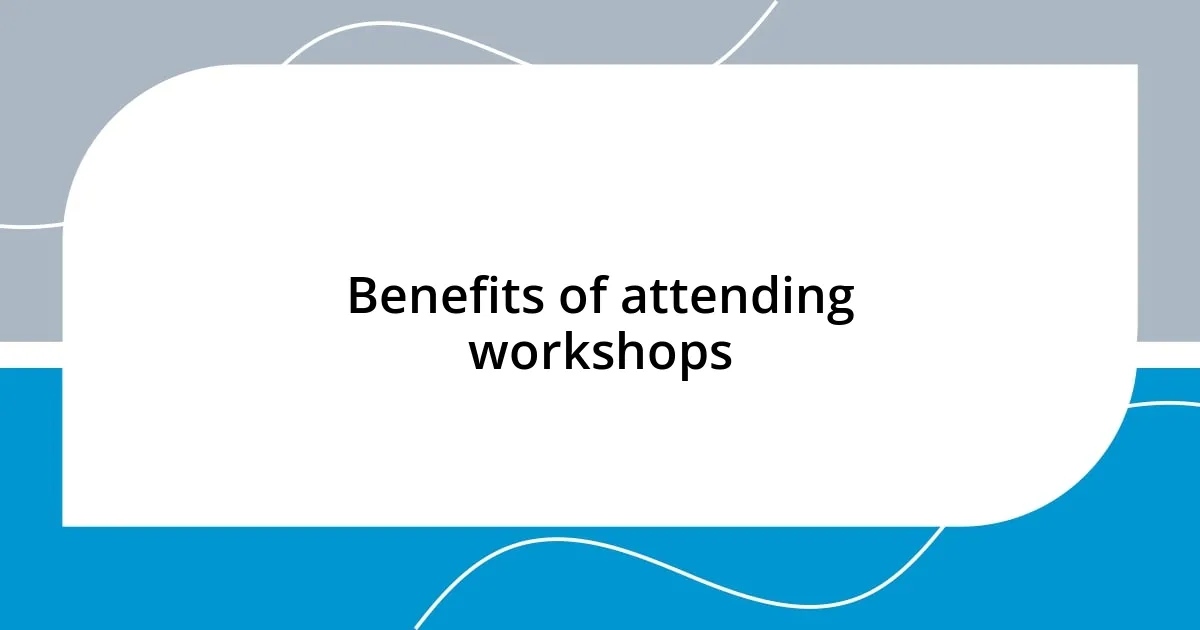
Benefits of attending workshops
Attending composer workshops offers incredible opportunities for growth that are hard to replicate elsewhere. I recall a workshop where we had real-time feedback sessions; the thrill of hearing my composition played by a live group was exhilarating! This not only heightened my understanding of orchestration but also illustrated how even minor adjustments could elevate a piece significantly. It’s those moments of realization that truly fuel passion and creativity.
Another benefit is the exposure to diverse styles and ideas. I remember sitting next to a composer who specialized in film scoring while I leaned towards contemporary classical. Sharing our work allowed us to teach each other about approaches I had never considered. It’s remarkable how such exchanges can broaden our musical horizons and inspire new directions in our own compositions.
Lastly, the networking aspect cannot be overstated. I often think back to a workshop where I met someone who later became a collaborator on a project that shaped my career. It’s more than just meeting people; it’s about building a community that nurtures your aspirations and supports your journey. The relationships I formed have proven invaluable, creating a web of connections that continues to inspire my work today.
| Benefit | Example |
|---|---|
| Improved Skills | Real-time feedback enhances understanding of composition techniques. |
| Diverse Perspectives | Collaborating with peers exposes you to new styles. |
| Networking Opportunities | Building lasting relationships can lead to future collaborations. |
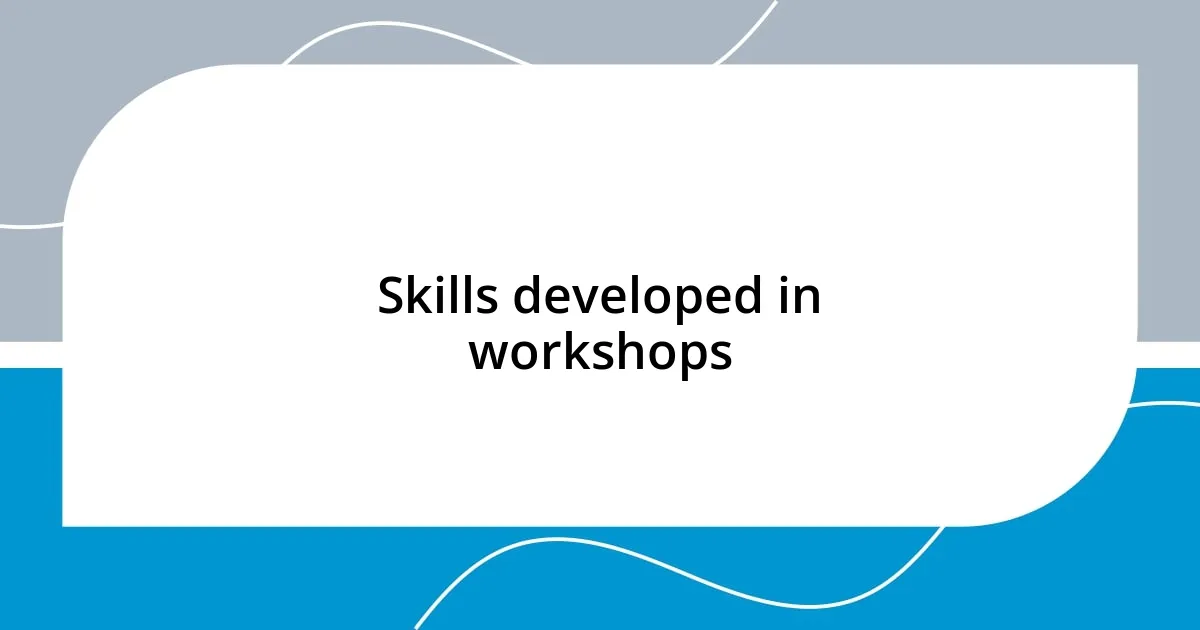
Skills developed in workshops
The skills I developed in composer workshops were transformative. Each experience pushed me to enhance not only my technical abilities but also my emotional expression in music. For instance, during one workshop, I was challenged to present a piece that conveyed a personal story. This exercise was deeply moving for me, as it encouraged vulnerability and allowed me to explore the intersection of my life experiences and my music. I felt a new depth to my compositions as I learned to integrate storytelling into my work.
Here are some specific skills I honed through these workshops:
- Communication: Articulating my ideas and intentions clearly while receiving feedback helped me learn how to convey my vision more effectively.
- Collaboration: Working with other composers taught me the value of blending different musical voices and perspectives, which enriched my own compositions.
- Critical Listening: The practice of actively analyzing and critiquing peers’ work improved my ability to hear the nuances in my own pieces, enhancing my overall craftsmanship.
These skills have not only shaped my music but also my journey as a composer, making each workshop a stepping stone for growth.
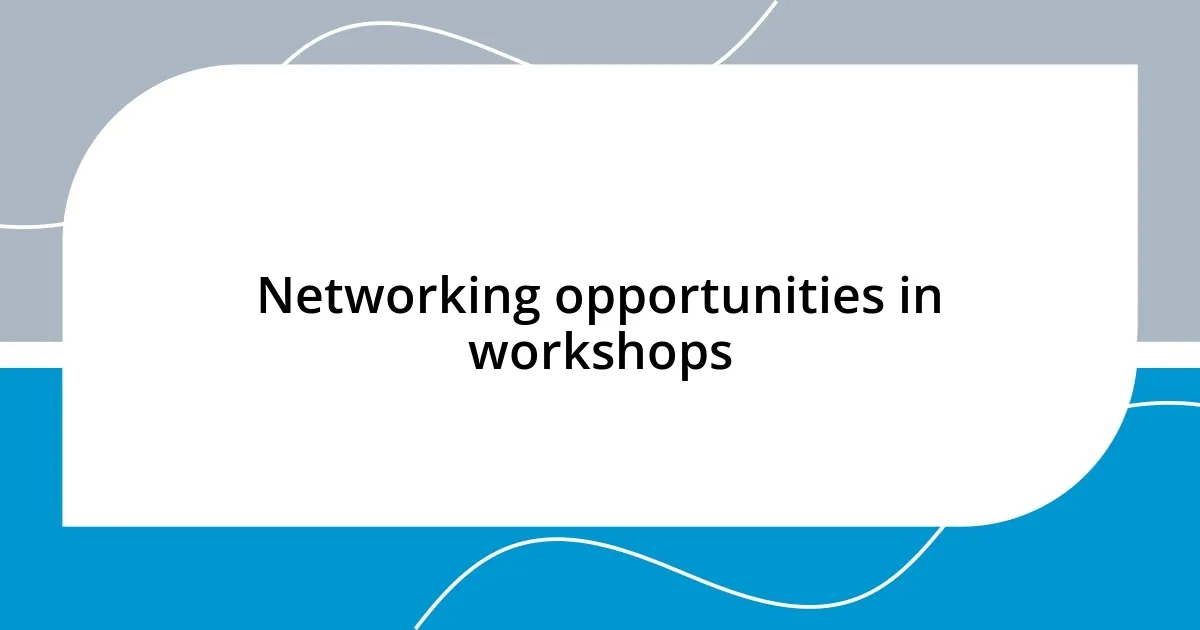
Networking opportunities in workshops
Networking in composer workshops is a game-changer. For instance, at one workshop, I met a fellow composer over lunch who shared my passion for contemporary music. We started discussing our influences, and before I knew it, we were brainstorming ideas for a collaborative piece. It’s moments like these that create lasting professional relationships, turning casual conversation into a fruitful partnership.
I find that workshops really do serve as melting pots of creativity. During a break at another event, I overheard a discussion about electronic music techniques that piqued my curiosity. I was so intrigued that I joined the conversation and ended up collaborating on a project that combined my orchestral background with electronic elements. That unexpected connection not only expanded my musical toolbox but also enriched my network—something I deeply value.
Have you ever wondered how a single conversation could transform your outlook on opportunities? I’ve experienced that firsthand. The relationships I’ve formed in these settings have led to mentorships, performances, and even invitations to showcase my work at festivals. Because of the community I’ve built, I no longer feel like I’m navigating my career alone; instead, I feel supported and inspired by a network of passionate creators.
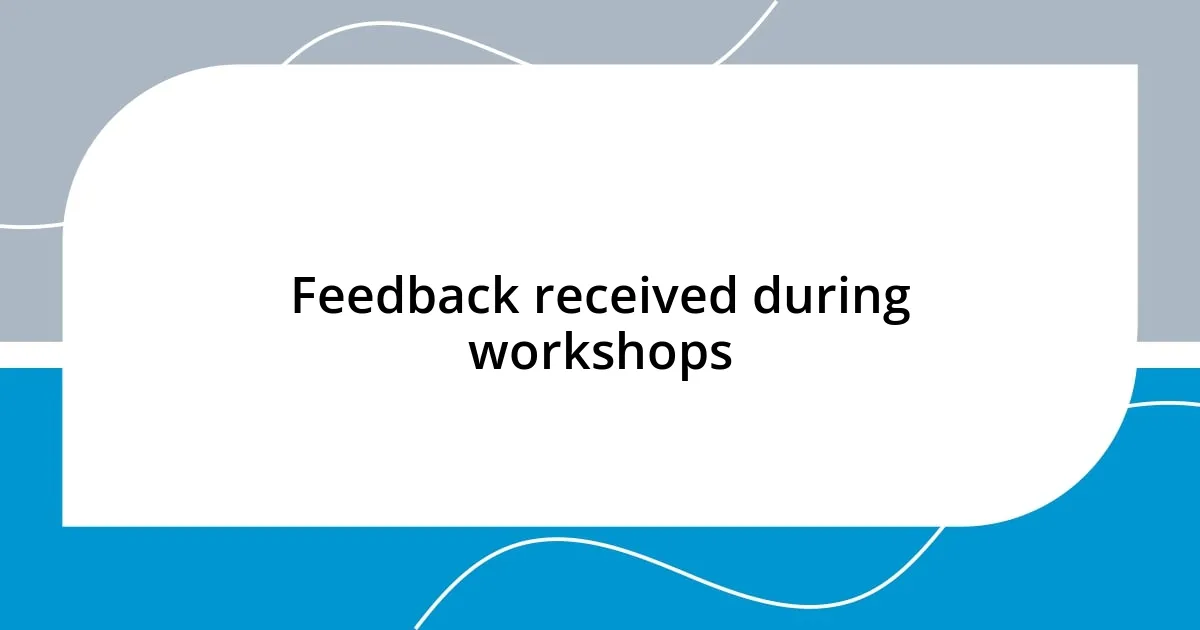
Feedback received during workshops
Feedback during workshops has been a highlight of my learning journey. I still vividly remember a moment when I presented a piece influenced by a significant life experience. The critique I received was not just technical; it struck at the heart of what I was trying to convey emotionally. This level of insight was invaluable and challenged me to rethink how my music communicates feelings. Have you ever had feedback that made you see your work in a completely new light? It’s a powerful experience that can reshape your artistic direction.
Often, the feedback received can be a mix of praise and constructive criticism, which I find essential for growth. At one workshop, a mentor pointed out how an unresolved dissonance could create tension in my piece, adding depth. This comment stuck with me because it illuminated a technique I hadn’t fully explored before. The realization that dissonance can evoke emotions just as much as harmony changed my approach to composition entirely. I remember feeling a bubbling excitement to experiment with this new concept in my next piece.
What I truly appreciate about feedback in these settings is the sense of community it fosters. At another workshop, after sharing my work, I was approached by a fellow composer who offered insights on instrumentation. This exchange led to a lasting friendship and continued discussions about our respective styles, pushing me to venture into new territories. Isn’t it fascinating how a simple piece of feedback can not only improve a composition but also spark creative collaborations? Each session leaves me more inspired and connected to others who share my passion.
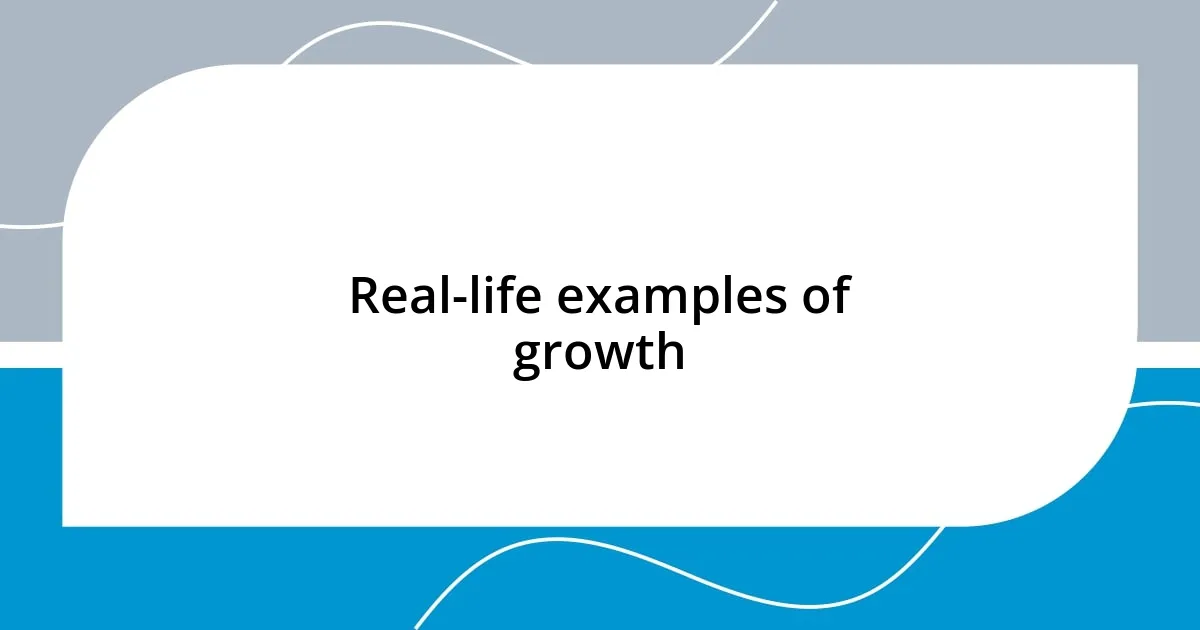
Real-life examples of growth
One striking example of growth for me was during a recent workshop where I presented a minimalist piece inspired by a fleeting moment in nature. A mentor gently pushed me to explore the space between notes, suggesting that silence can be just as impactful as sound. This advice resonated deeply, prompting me to embrace quieter moments in my compositions. Have you ever discovered that what’s left unsaid can be just as powerful as a grand statement? That realization reshaped my approach and made my music feel more profound and intentional.
At another workshop, I had a memorable interaction with a group of young composers who approached me after my presentation. They expressed how my work inspired them to embrace their unique voices, reminding me of my own journey when I was starting. It was a surreal feeling to see the impact of my experiences reflected back at me. This encounter sparked a realization: growth is often cyclical. Isn’t it incredible how sharing our journeys creates pathways for others to navigate their own?
I still cherish a moment when a fellow composer suggested improvisation could infuse life into my structured pieces. Initially hesitant, I took the plunge and found a newfound joy in spontaneity. That simple suggestion led me on a creative path, where I began to weave improvisational elements into my work. It was as if a whole new world of possibilities opened up! How often do we hold ourselves back because we fear stepping outside our comfort zone? Embracing those moments of uncertainty can lead to incredibly rewarding growth.
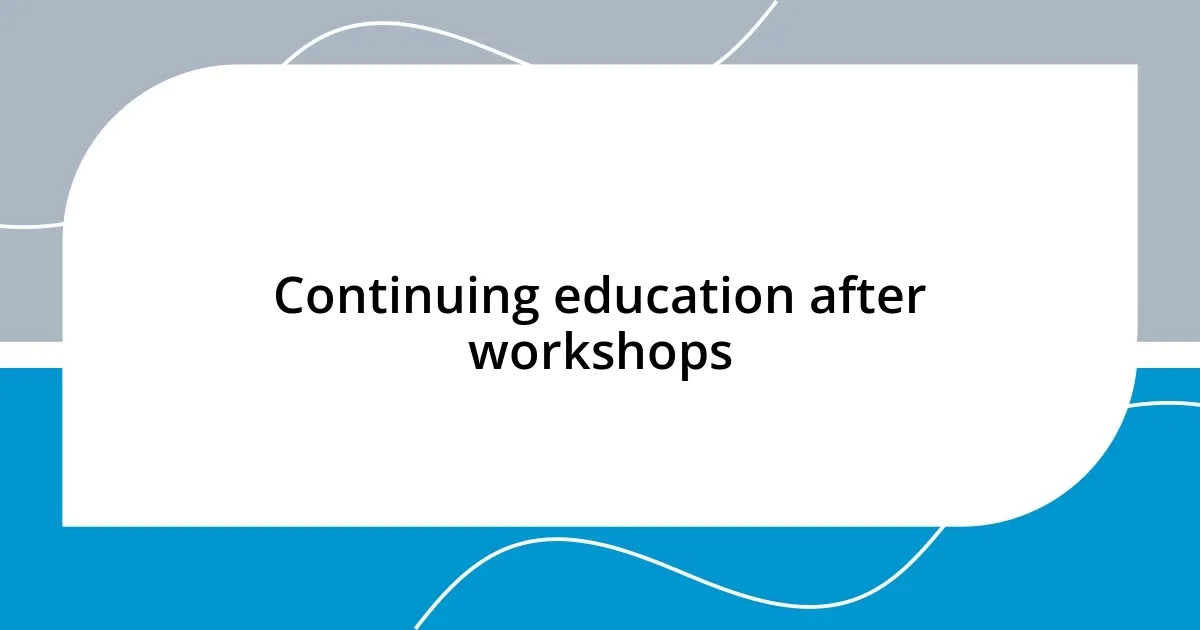
Continuing education after workshops
Continuing education after workshops has become a natural extension of my artistic journey. I found that the lessons learned don’t just stay in the workshop environment; they echo long after I leave. For instance, I remember diving into online forums where composers share their work and feedback. Engaging with these communities allowed me to apply the techniques I polished during workshops almost immediately. Have you ever felt like a certain skill or insight just needed a little more exploration? That’s how I approached these discussions, and it has deepened my understanding tremendously.
Another enriching avenue for continuing education was taking dedicated online courses tailored to specific compositional techniques. I enrolled in a rhythm-focused class that revived my love for tempo variation after a workshop mentor had emphasized its importance. It was an eye-opener to see how different rhythmic structures could transform a piece entirely. Have you ever stumbled upon a new resource that lit a spark in your creative process? Connecting those workshop insights with structured learning truly amplified my work.
Additionally, I made a point to keep in touch with workshop mentors and peers. Regular check-ins and sharing new works opened doors for collaborative projects that would not have occurred otherwise. It’s fascinating how a simple text or email can reignite discussions about our shared interests and push us forward creatively. I found myself reflecting on my progress when discussing our projects, which highlighted areas for further development. Isn’t it amazing how relationships formed in workshops can blossom into powerful networks of support and inspiration? That ongoing dialogue has become a vital part of my growth as a composer.

